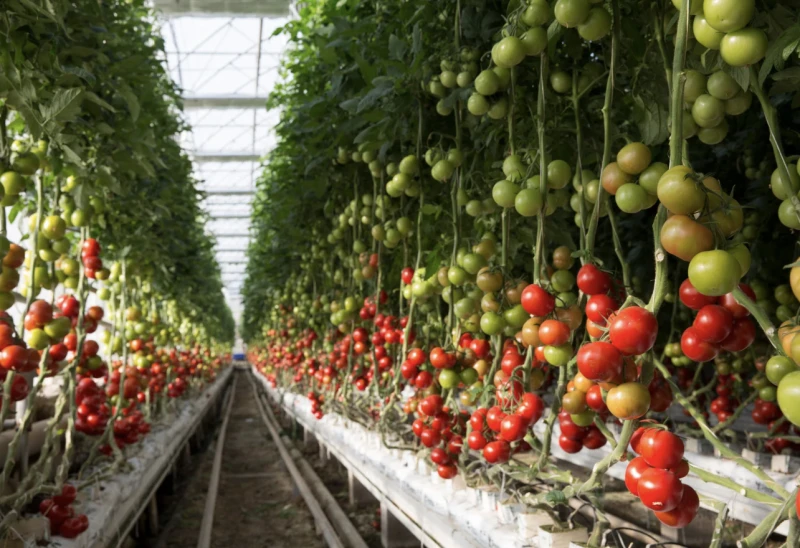The confluence of AI and biotechnology will drive the development of unprecedented sustainable crops
The confluence of AI and biotechnology will drive the development of unprecedented sustainable crops


A major review published in the prestigious journal Nature today outlines how artificial intelligence and biotechnology could transform global crop production — helping to build more resilient food systems in the face of climate change, pests and population growth.
An international team of researchers —from China, the USA and Europe, including Aberystwyth University — has set out a roadmap for integrating AI with genome editing, protein design, high-throughput phenotyping and omics technologies which analyse the genetic and chemical makeup of plants.
They say adopting these techniques would accelerate the improvement of crops that are more productive, sustainable and climate-resilient and could even lead to domesticating new crops.
Professor John Doonan, Director of the National Plant Phenomics Centre at Aberystwyth University’s Institute of Biological, Environmental and Rural Sciences (IBERS), said:
“Think of it like designing and building a bridge. We now have the tools to engineer crops with similar precision — combining biological insights with AI to build plants that can withstand drought, disease, and other stresses.”
The review highlights how AI can:
- predict the best combinations of genes for yield, nutrition and stress tolerance
- design novel proteins to enhance plant defences and performance
- integrate very complex datasets to guide smarter, faster breeding decisions
Professor Doonan added: “This is about building resilience into our crops from the ground up. By uniting AI with cutting-edge biotechnology and sustainable farming practices, we can future-proof food production for generations to come.”
The work aligns with IBERS’ strategic focus on resilient crops and was supported by the Biotechnology and Biological Sciences Research Council (BBSRC) through its Resilient Crops programme, and by the Engineering and Physical Sciences Research Council (EPSRC) as part of its AI for Net Zero initiative.
A version of this article was originally posted at Aberystwyth University and is reposted here with permission. Any reposting should credit both the GLP and original article. Find Aberystwyth University on X @AberUni

 | Videos | More... |

Video: Nuclear energy will destroy us? Global warming is an existential threat? Chemicals are massacring bees? Donate to the Green Industrial Complex!
 | Bees & Pollinators | More... |

GLP podcast: Science journalism is a mess. Here’s how to fix it

Mosquito massacre: Can we safely tackle malaria with a CRISPR gene drive?

Are we facing an ‘Insect Apocalypse’ caused by ‘intensive, industrial’ farming and agricultural chemicals? The media say yes; Science says ‘no’
 | Infographics | More... |

Infographic: Global regulatory and health research agencies on whether glyphosate causes cancer
 | GMO FAQs | More... |

Why is there controversy over GMO foods but not GMO drugs?

How are GMOs labeled around the world?

How does genetic engineering differ from conventional breeding?
 | GLP Profiles | More... |

Alex Jones: Right-wing conspiracy theorist stokes fear of GMOs, pesticides to sell ‘health supplements’




 A single high dose of LSD can ease anxiety and depression for months
A single high dose of LSD can ease anxiety and depression for months CRISPR pork: U.S. approves first gene-edited pigs for consumption
CRISPR pork: U.S. approves first gene-edited pigs for consumption From plastic coasters to human hearts: Inside the race to print the human body
From plastic coasters to human hearts: Inside the race to print the human body Baby food panic, brought to you by trial lawyers hoping to prosecute by press release
Baby food panic, brought to you by trial lawyers hoping to prosecute by press release ‘SuperAgers’: Why some people have the brains and memory capacity of people decades younger
‘SuperAgers’: Why some people have the brains and memory capacity of people decades younger  Viewpoint: Life and death decisions: RFK, Jr.’s shady FDA “expert panels” operate in secret with no transcripts or conflict of interest reviews
Viewpoint: Life and death decisions: RFK, Jr.’s shady FDA “expert panels” operate in secret with no transcripts or conflict of interest reviews From ‘Frankenfood’ to superfood: Can the purple tomato overcome GMO myths to win over consumers?
From ‘Frankenfood’ to superfood: Can the purple tomato overcome GMO myths to win over consumers? When farmers deny science: The hypocrisy hurting agriculture’s credibility
When farmers deny science: The hypocrisy hurting agriculture’s credibility GLP podcast: ‘Fight fire with fire.’ How one science advocate converts vaccines skeptics
GLP podcast: ‘Fight fire with fire.’ How one science advocate converts vaccines skeptics
